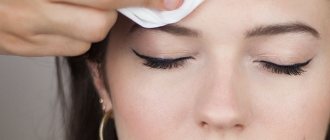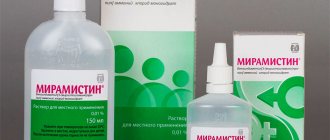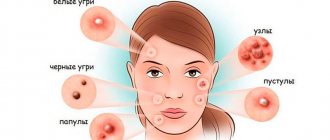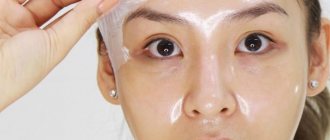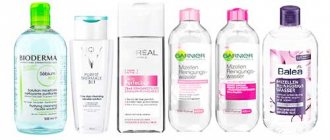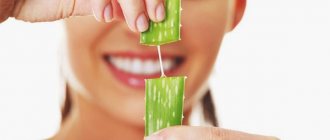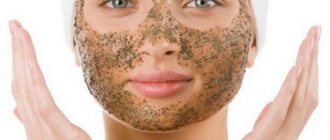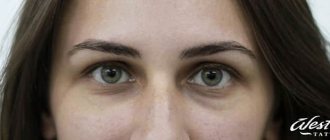The word “alcohol” is inevitably associated with disinfection, even if it concerns the face. What’s simpler: a pimple came out, burned it with alcohol - and the problem was solved.
There are enthusiasts who are ready to use this alcohol to wipe their skin “for preventive purposes.” However, one must keep in mind: before deciding on such procedures, it would be good to study the properties of alcohol-containing substances and their effect on the skin. Moreover, there are quite a few types of alcohols, and each has its own “character”.
What should an effective disinfectant contain?
Today there are two types of antiseptics that work well against germs, bacteria, and viruses.
Read also: blue and gray IN COLOR BALANCE
The first type is alcohol-based liquids; it should contain at least 60%, preferably more. If the content is less, then the protein shell of microbes and viruses will not be destroyed and some of them will remain invulnerable. The alcohol must be ethyl or isopropyl.
The second type of antiseptic is based on chlorhexidine. It does not erode longer, provides longer-lasting protection, but damages the skin of your hands. However, alcohol also dries the skin, so such liquids usually contain softeners.
Camphor alcohol
Is it possible to wipe your face with camphor alcohol? This drug is considered one of the most effective remedies in the fight against acne. But camphor alcohol should be used in combination with other drugs, because it eliminates the external manifestation of acne, but not the cause of its formation. The appearance of acne may indicate the presence of a disease that requires treatment.
Contraindications
It is prohibited to wipe your face against acne with alcohol solutions under the following conditions:
- The presence of a dry type of dermis, prone to peeling.
- Open wounds, scratches at the treatment site.
- It is not recommended to wipe the skin if you have skin diseases such as psoriasis, eczema.
- Kidney, liver failure.
- Not recommended for use in children under twelve years of age.
- It is forbidden to use ethanol on the face if the dermis is hypersensitive.
- The period of gestation and breastfeeding. At this time, it is recommended to use more gentle cosmetic products for facial care.
Inappropriate use of alcohol solutions in the fight against facial skin imperfections can lead to negative effects such as burns, allergic reactions, and various rashes.
Proper application
Indications for use
- The presence of pigmented areas on the facial skin caused by acne.
- Black dots.
- Oily and problematic skin types, prone to increased sebum production.
In its purest form
It is best to use locally rather than treating the entire surface of the skin. It is necessary to apply the product to a cotton pad twice a day and treat acne with it, each separately. The action time is from 15 to 20 minutes, after which you should rinse your face with warm water. The result is that only inflamed areas are treated, while healthy skin remains untouched.
The course of treatment takes from one to two months. You should not use acid regularly, as the skin will get used to it and the product will no longer have the desired therapeutic effect.
Mask with the addition of cosmetic clay and badyagi
You will need to mix the components in equal proportions. Afterwards, you need to add warm water to the mixture until a creamy consistency is obtained. To complete the preparation of the mask, you need to add a couple of drops of acid solution. The composition is evenly applied to the surface of the skin. Action time: 15 minutes. The mixture is removed with warm water. Frequency of use: once a week.
The main effect is that the procedure helps not only fight acne, but also eliminates oily shine. Moreover, the complexion improves significantly.
The effects of alcohol on the skin
Alcohol is a substance that has a lot of positive effects: it eliminates pathogens, stops inflammatory processes, deeply cleanses and tightens pores.
The optimal concentration of the substance, used in the manufacture of lotions, tonics and other cosmetic products, allows you to quickly and effectively get rid of imperfections in the dermis.
But what happens if you wipe your face with a regular alcohol solution purchased at a pharmacy? Using alcohol in its pure form for acne and pimples, you can get the opposite effect, namely:
- The appearance of a feeling of tightness on the skin.
- Dryness, peeling.
- Destruction of the protective film of the dermis.
- Thinning of the epidermis.
- Violation of fat balance, activation of sebum production.
- Clogging of pores, stimulation of inflammatory processes.
So can you use alcohol against acne? Adequate use of the solution will avoid negative effects and get rid of facial skin imperfections.
Methods of disposal
Advising on what works well to remove acne marks on the face, experts draw attention to the need for an integrated approach:
- diagnosis by a doctor, drawing up recommendations taking into account the individual characteristics of the patient’s skin;
- consultation with a cosmetologist who will recommend hardware and injection methods;
- regular use of home care products.
What can you do at home?
To get rid of stains, it is best to take the advice of experts who recommend home care products designed to resolve scars, such as Contractubex. The enzymes contained in these medications are designed to break down the dense collagen fibers that form scar tissue.
But home peels and self-exfoliation are unlikely to give the expected effect. They act at the level of the epidermis, and acne is a deep-seated change in the skin that affects the dermis. That is why it is recommended to consult a doctor for professional treatment of post-acne and prescribe the necessary products, which should be designed for deep care.
What treatment methods are used in cosmetology?
How to quickly remove acne, spots, scars and cysts? Patients often come to a cosmetologist with such a request. Experts most often recommend the following treatment options:
- Phototherapy. Exposing the affected areas to light of a certain length improves the condition of the skin. As a result, inflammation decreases and erythema disappears.
- Microdermabrasion. This is a delicate procedure, during which the cosmetologist removes the top layer of the epidermis and carefully polishes its surface. It is effective if home cosmetics do not allow you to choose a product that can remove post-acne.
- Laser resurfacing. It is not mechanical and is necessary to improve the relief due to the action of the light beam. The laser allows you to fine-tune the depth of exposure, but it is important to remember that for about 10 days after it, crusts and redness will remain on the face.
How often should you use a scrub and why?
The main thing in facial skin care is cleansing. Without this procedure, it is useless to use other cosmetics. The scrub is able to thoroughly cleanse the skin, making it soft and tender.
But your daily facial skin care routine shouldn't include a scrub. The intensity of use of this product depends on the type and condition of the skin, its sensitivity, age and time of year. Often, a deep cleansing scrub is used no more than once a week.
The rules for daily facial skin care do not include the constant use of scrubs. This is undesirable from the point of view of skin functioning. The skin is programmed with a natural exfoliation process. Therefore, normally it is enough to support these processes.
In order not to harm the skin, you need to use scrubs with small spherical or hemispherical particles. The products are applied in a circular motion, which helps to gently remove dead skin cells from the epidermis. Rough scrub particles can injure and scratch the skin. Some scrubs contain particles that dissolve during application. This cleansing is more effective due to the enzymes contained in the scrub.
Every day care for oily skin and the use of scrubs should be agreed upon with a cosmetologist. For example, if there are purulent rashes on the skin, the scrub will only increase inflammation and lead to the spread of infection.
Proper Use
This drug contains alcohol, which can dry out the skin.
Therefore, it should be used with caution and correctly. Here are some tips for those who don't know how to wipe their face with salicylic acid for acne.
- Before wiping your face with this drug, you need to remove your makeup. Lotions and tonics will help with this. You can use micellar water. After this, you need to wash your face with warm water.
- Use a towel to dry the skin.
- Take a cotton swab and soak it in salicylic acid. The stick should not drip.
- If you are using the drug to fight acne, then apply a moistened stick to the affected areas of the skin.
- If there are a lot of acne, use a 1% solution to wipe the problem areas.
- If during use there is a feeling of discomfort on the skin (burning, tingling), it is necessary to rinse off the product with warm water.
You can also use salicylic ointments to combat acne. They are applied only to areas where there is acne; healthy skin should not be lubricated. A 2% ointment is used. After applying the ointment, apply a bandage to the pimple for 2-3 minutes. Such procedures should be carried out from 5 days to 2 weeks.
How to properly use alcohol to treat acne?
If you decide to use alcohol as a means of combating acne, then in this case you should follow some rules:
- Pure alcohol or cosmetics containing it are strictly prohibited to be used daily. The best use is 2-3 times a week, but no more than 5.
- You can use alcohol only for oily skin, or at least for combination skin, but for dry skin, ethanol is strictly prohibited. For dry and normal skin, herbal creams and lotions without an alcohol base are best.
- The treatment should not be carried out over the entire face, but only targeted at inflammation. To do this, you can use cotton swabs. This method is not only convenient, but also will not damage the healthy cells around the pimple.
- It is important not to overdo it with the solution so that it does not spread all over your face.
- The treatment is carried out in this way: a cotton swab is blotted with alcohol, then applied to the pimple, and the area around the acne is also disinfected.
- Initially, you should use 1% alcohol. After some time, you can switch to a more concentrated one - 2%.
- Before using alcohol to combat acne, you should evaluate your skin's sensitivity to the substance. It happens this way: a drop is applied to the wrist, after which you have to wait about 5 minutes. If there is no reaction from the skin - itching or redness, you can safely use alcohol.
- In order for the skin to recover faster after these procedures, you can apply a nourishing cream.
But to definitely get an answer to the question: “Is it possible to wipe your face with alcohol for acne?”, you will have to visit a dermatologist. Only he can choose the ideal product for a specific skin type.
Formic alcohol
Is it possible to wipe your face with formic alcohol? This product is not suitable for people with sensitive skin. When using formic alcohol, you should be careful and first check for allergic reactions using the method described earlier. But there is one difference: you need to wait not 5 minutes, but about a day.
To remove acne, apply alcohol to a cotton pad. Then rub it into the damaged skin in a circular motion, but very carefully, without pressure. No pre-cleansing of the face is required.
At the end of the procedure, a nourishing cream is applied. Acne can be treated in this way from two weeks to a month, depending on the scale of the problem.
Unlike other alcohols, this one has a strong exfoliating effect, so it is optimal to alternate this product with other more delicate preparations. In this way, the skin will not be damaged by the medications, and acne will disappear.
Alcohol for facial cleansing: benefit or harm?
It makes sense to consider each of them in more detail.
Medical
Ethyl alcohol quite effectively cleanses and disinfects the skin, and also relieves inflammation and tightens pores. However, this does not mean that it can be used without concern. And there are several reasons for this.
Firstly, by killing pathogenic microbes, it, like all similar drugs, deprives the skin of its natural protective film. New bacteria, entering such a defenseless dermis, attack it with renewed vigor.
naturally formed fat balance in it Trying to restore it, the skin doubles the rate of sebum production, which can clog pores and cause inflammation.
If you use medical alcohol for a long enough time, you can dry out the epidermis, and its sensitivity and vulnerability will increase, simply put, the skin will simply be damaged.
However, this does not mean that ethanol is completely contraindicated, it just needs to be used wisely and extremely carefully. Under no circumstances should you wipe your entire face with alcohol! You can only target acne.
You need to use medical alcohol several times a week - depending on your skin type, this can be two or five times.
It is worth noting that high concentration ethyl (or isopropyl) alcohol - 70% - is used to impregnate sanitary alcohol wipes. Such a product can be used for the same purpose, and also, if necessary, squeeze out a ripe pimple.
Formic
Formic alcohol contains formic acid, which has strong antimicrobial properties. In addition, this drug dries out the skin.
Is it possible to wipe your face with formic alcohol? Before answering this question for yourself, it is recommended to test this substance for an allergic reaction by dropping the solution on your wrist. If within several hours no changes occur on the skin in this area, if your health does not worsen, formic alcohol can be tried to treat acne.
This type is absolutely not suitable for people with dry skin - it can have a detrimental effect on it. But it is recommended for those with oily and combination skin and is suitable for wiping affected areas.
This is done with a cotton wool disc soaked in alcohol, carefully moving it in a circle. Before such wiping, it is not recommended to clean the dermis so that moisture does not evaporate from its cells. About five minutes after the procedure, when the face is dry, it is useful to apply a light moisturizing cream to it.
At first, for treatment it is enough to wipe the skin no more than once a day. If after 5-6 days no negative manifestations were observed, the procedure can be performed twice.
Boric
An inexpensive, accessible and time-tested remedy for getting rid of acne is boric alcohol.
And although you cannot expect a quick result from its use - it will become noticeable only after five days, this drug acts on the epidermis quite carefully, without drying it out.
Its use is extremely simple: wipe problem areas with a cotton swab soaked in the solution.
After two days, you should carefully examine the condition of the dermis. If excessive dryness is not observed, then you can allow yourself to use this product at the beginning and end of the day and do this for two months.
If during treatment the skin begins to peel, it is necessary to limit the surface to be wiped only directly to the pimples, cauterizing them with a cotton swab dipped in boric alcohol.
The effect of this type of alcohol is valuable because it burns out acne gradually, deeply cleansing the skin. Having got rid of this trouble, you can periodically use boric alcohol for the purpose of prevention.
Ammonia
When it comes to ammonia, the first thing that comes to mind is its specific pungent smell.
Inhalation of ammonia vapor can cause rapid breathing, tachycardia, and increased blood pressure, so the use of ammonia solution should be accompanied by extreme caution.
And it has a wide range of action: in addition to cleansing, it is also antifungal and antimicrobial.
Ammonia is indicated for use by those with oily skin when washing their face in the morning. This can be done in two ways:
- rinsing the face with a mixture of alcohol and water;
- wiping problem areas with a 1% ammonia solution using a cotton pad.
Camphor
The excellent antiseptic properties of camphor alcohol make it a good remedy for cleansing the dermis.
However, it also has a number of serious disadvantages. So, if it is regularly applied to large areas of the face, it can cause a severe allergic reaction.
Dizziness, skin rash, nausea, tachycardia - these are all symptoms of an overdose of this drug. If it is used for a long time, camphor may accumulate in the body, which can lead to seizures.
Therefore, the use of this drug should be very careful. It is better to do this pointwise, using a cotton swab - especially on the affected areas.
Camphor alcohol cannot be used to treat the dermis of the shoulders, chest, or neck. Since the skin here is very delicate and sensitive, burns may occur.
Salicylic
Although salicylic acid has become quite popular in the fight against acne, it can be called a double-edged sword: the pros and cons of its effects are almost balanced. Among the positive properties:
- skin disinfection;
- drying;
- elimination of inflammation.
The main disadvantage, as in the case of medical alcohol, is the destruction of the natural protective film on the skin during its use and the disruption of fat balance with all the ensuing consequences.
In order not to damage your appearance and achieve the desired effect, you must use this product correctly, which means: do not exceed the recommended dosage so as not to cause excessive dryness of the skin, and also do not try to combine salicylic alcohol with other substances intended to combat acne.
For cosmetic purposes, alcohol with a 1-2% concentration of salicylic acid is most suitable. Soak a cotton pad in it and gently wipe problem areas of the skin.
There is also the following recommendation: since the concentrated preparation can cause peeling of the skin, it is better to use it for wiping, diluting it with warm boiled water in a ratio of 1:2.
This manipulation can be carried out twice a day - in the morning and at night.
Levomycetinic
Levomycetin is the main “actor” in the composition of the alcohol of the same name. Like any antibiotic, it has an antimicrobial effect.
By influencing the cellular structure of harmful microorganisms, chloramphenicol inhibits their reproduction, not allowing them to develop further, which is what is required in the fight against acne.
Levomycetin alcohol is most often used to get rid of acne of hormonal origin: each of them is burned separately, trying not to get on undamaged areas of the skin, so as not to dry it out.
There are certain restrictions regarding alcohol with chloramphenicol. It should not be used for serious skin diseases such as psoriasis or eczema; for fungal diseases; pregnant and lactating women; children.
After using this type of alcohol, there are cases of acute allergic reactions. In such a situation, it is necessary to stop using it.
You might be interested in:
Is it possible to wipe your face with peroxide? Effective masks to tighten pores. How to even out your complexion?
It is known that many cosmetics are alcohol-based. These include washing solutions, lotions, and tonics.
Have you ever used similar products or any of the alcohols described to cleanse your face or fight acne? How are the results? Share your impressions of their effects on your skin in the comments.
Having considered all the possible types of alcohol to wipe the face against acne, we can come to the conclusion that almost each of them can become a worthy fighter if two basic conditions are met: the dosage is not exceeded, and the procedures are carried out extremely carefully and correctly.
How to prevent acne and post-acne
To prevent acne and the development of post-acne, you must follow the rules of face and body care. It is important to use cleansing and skin care products selected for your age and skin type, and use them only for their intended purpose and according to the instructions.
Do not squeeze blackheads or white pimples.
To speed up their healing, you can use special creams, serums or other targeted products. If acne does not go away or its number increases, a visit to a dermatologist is necessary.
To protect your skin from inflammation, try not to touch your face or rub it with your hands during the day; if you talk on the phone a lot, treat your gadget, as there are always a lot of bacteria on it that get on the skin.
Change your towels more often or ditch them in favor of disposable paper towels. Be sure to wash your face twice a day and take a shower. For washing, you need to choose mild cleansers. If you are prone to acne, you need a soft, delicate and well-cleansing cosmetic product. Regular soap or shower gel may be too harsh.
